BMW Finally Puts Its Marker in the EV Race
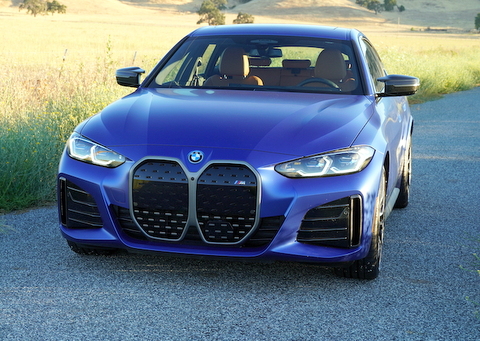
BMW’s newest EV delivers unique style and world-class performance.
BMW has been a pioneer in the EV business for more than a decade with quirky vehicles like the i3 city car and outrageously high-tech and performance-oriented i8 plug-in hybrid. These cars appealed to niche drivers, but hardly to the mainstream luxury EV buyer.
For 2022, BMW has come to market with a new EV that, at first glance, could be just another 3- or 4-Series sedan. It looks refreshingly normal, but to BMW lovers, it is a head-turner because they know this is not your run-of-the-mill BMW sedan.
What is the i4?
BMW calls the i4 series a “Grand Coupe,” a 4-door sedan with a hatchback, but it probably should have been called a 5-door hatchback. Perhaps this is to link it with the conventional 4-series BMW. BMW has been very clever with the hatchback because you don’t realize it is a hatchback until you open it. The i4 has a more extended roofline that helps with rear-seat headroom and luggage space.
There are two versions of the i4, the single-motor eDrive40 and the performance version, which is the first BMW EV tuned by the M division, the dual-motor M50.
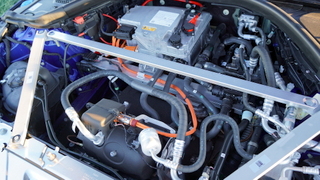
The eDrive40 version has a single 340 horespower (250 kilowatt) electric motor driving the rear wheels with an EPA range of 301 miles. The vehicle that Clean Fleet Report tested is the M50 performance version with all-wheel-drive from two current-excited AC synchronous motors driving all four wheels with a combined power of 544 hp (400 kW). The i4 has a single-speed transmission. With this motor setup, getting 3.3 second 0-60 times with the Sport Boost engaged is easy (it adds 50 hp for 10 seconds). That’s faster by .02 seconds than the traditional rear-wheel-drive M3 Competition. And this is with a Beemer that weighs 5,063 pounds!
This performance version is just that, but has a shorter EPA range—it drops to 227 miles with the optional 20-inch wheels. Stick with the standard 18-inch wheels on the M50, and it picks up 50 or so EPA miles to 270.
Both versions of the i4 have the same 83.9 kWh (80.7 kWh usable) lithium-ion battery mounted under the cabin floor. The battery’s charging system includes a 200 kW CCS L3 DCFC charging system and 7.4/11.0 kW (single and three-phase charger) J1772 L2 charging capability.
If vehicle range is at the top of your needs, then the eDrive40 is your car, but if cutting-edge performance that takes no prisoners and puts the M3 to shame is more important, then the M50 is your ride of choice. We did not have an i4 eDrive40 to test, but in summary, it is like the M50, except it’s less expensive, slower, only has a single motor driving the rear wheels, and is more of a long-range economy vehicle. That may not be a bad thing.
A Modern and Enjoyable Cockpit
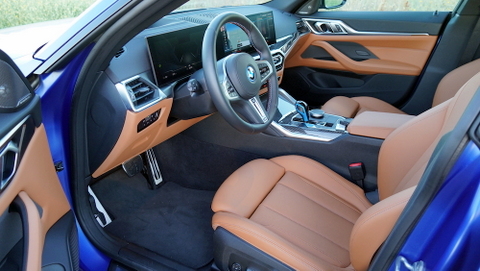
If you enjoy the interiors of other BMWs, the i4 won’t disappoint. The interior is well thought out, with two giant screens displaying both the drivers and infotainment information on clear, crisp screens. My main complaint is that the HVAC system is controlled exclusively from the center screen, with only individual temperature sliders available. Getting to the HVAC details requires diving down a layer on the screen. The driver’s gauge cluster is very configurable, but do that when the car is parked. The i4 has a fantastic optional head-up display (HUD) and a 16-speaker 464-watt Harman Kardon surround sound system with excellent wireless CarPlay and Android Auto integration.
The i4’s software gets better over time with over-the-air (OTA) software updates standard with iDrive8. There are three drive modes—Eco Comfort and Performance—to choose from. With the latest version of iDrive, multiple driver profiles can set everything from drive mode to one’s favorite radio stations, HVAC and seat positions. We spent most of the time in Eco or Comfort, while the Performance mode allows you to watch your range disappear in real-time when the Go-Pedal goes to the floor. The backseats are comfortable with plenty of headroom for the 98th percentile adult. The rear luggage compartment is spacious, with underfloor compartments to store the dual-mode L2 charger and small items. Depending on whether the rear seats are up or down, 16.6 to 46 cu. ft. of cargo space is available.
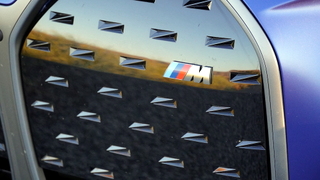
Safety Technology
As of this writing, neither the National Highway Traffic Safety Administration nor the Insurance Institute for Highway Safety have crash-tested the i4.
The i4 does come with an extensive list of advanced driver assistance systems (ADAS) standards, including rear cross-traffic alert, front collision warning, rear collision prevention, lane-keeping assist, lane-departure warning, adaptive cruise control, rear-collision prevention, rear cross-traffic alert, and blind-spot detection. The i4 has the enormous double kidney grille that has become a conversation starter. That massive grille is where the front-facing ADAS sensors are. The grille denotes that this is an Electric BMW and can be a real head-turner.
How Does It Drive
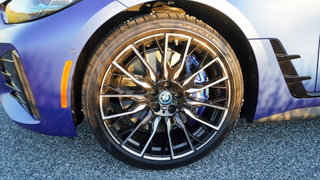
While we did not get to drive the i4 eDrive40, our time with the i4 M50 was outstanding. The ride is tranquil with no tire or wind noise. The i4 can fill the silence with sound effects tailored to the drive mode, from a roaring M-series V8 in Sport mode to a UFO sound in Comfort mode and gentle wind noises in Eco mode. Thankfully, this feature can be turned off if desired.
The M-tuned suspension is never disagreeable and makes the i4 a very comfortable daily driver. Whether the car is at 30 or 130 mph, the ride is firm but supple, never jarring or harsh. Combine that with the amazingly quick throttle response, and it’s a worthy competitor to any performance vehicle, ICE or BEV.
2022 BMW i4 M50 Specifications
| Performance | 536 hp-586 pound-feet of torque,
0-60 3.7~3.2 seconds w/Sport boost |
| Powertrain | Dual electric motors, 1-speed transmission, all-wheel drive |
| EPA Range | 270 miles/19” tires, 227 miles/20” performance tires |
| Weight | 5,018 pounds (base model) |
| Battery | 83.9 kWh (80.7 kWh usable) lithium-ion battery |
| Price | $65,900.00, as tested $82,620 + $995 destination charge
The i4 qualifies for the $7,500 federal tax credit and local or state incentives. |
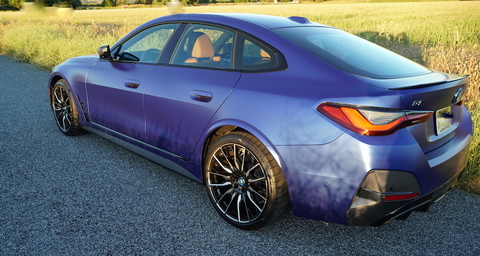
The 2022 BMW is a Game-changer
Our test M50 vehicle came equipped with over $15,725 worth of pricy options, including a $3,600 paint job, $3,100 worth of carbon fiber trim, 20″ wheels and all sorts of technology upgrades.
Being a BMW, the car’s craftsmanship is impeccable, the cockpit is comfortable and well thought out and, as a GT road car, it is in the best of class.
But it is a high-speed and comfortable vehicle, and forgoing the 20″ performance wheels, it gets the M50’s range close to the eDrive40’s range, which is at the top tier of BEVs on the market today.
If you are considering a premium BEV, then BMW’s re-entry into the market with the i4 offers a clear alternative to the legacy luxury BEVs today.
Story and photos by Gary Lieber.
Make sure to opt-in to the Clean Fleet Report newsletter (top right of page) to be notified of all news stories and vehicle reviews.

No charging network like Tesla
Sure, it is faster than my Model 3 awd Long Range, which is 353 miles per charge
I paid $51,346 total.
And that BMW’ grill, does it second as a bee hive?
@E.A.Swenson,
Setting aside the cheap shot on the styling (to each his or her own, we say), you make some good points. The non-Tesla infrastructure is catching up quickly, though. We haven’t driven the i4 and Model 3 back-to-back, but that sounds like a fun future assignment. –ed.